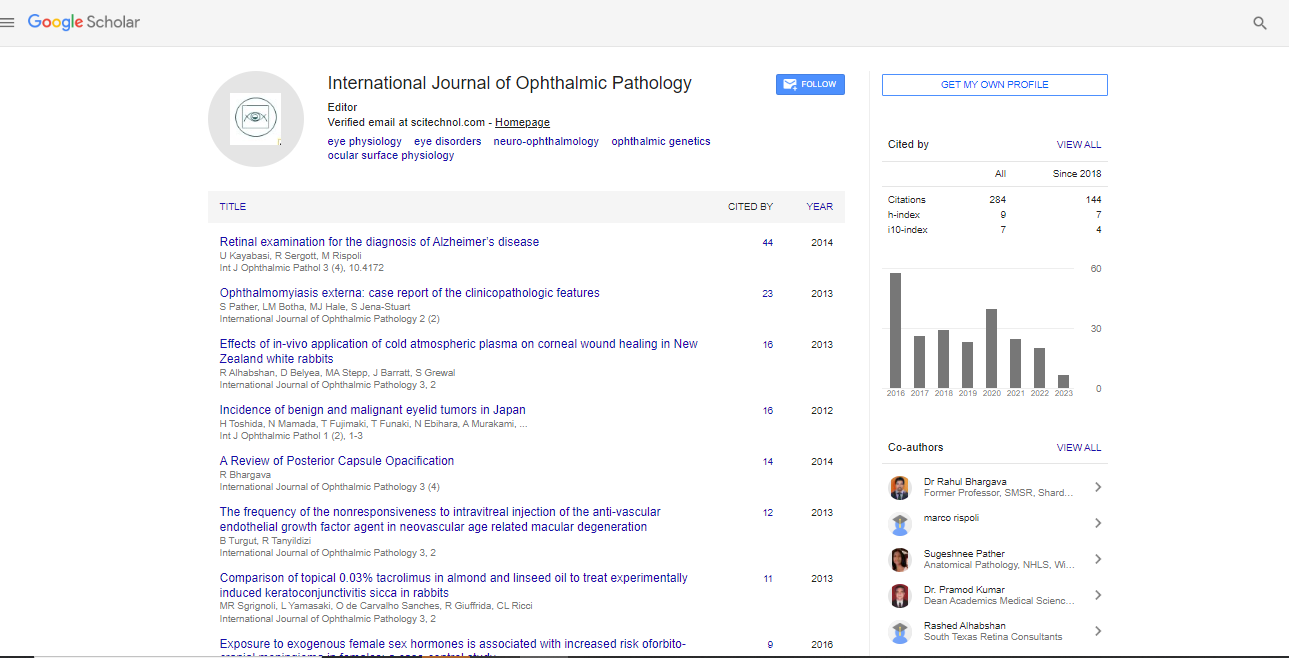Commentary, Int J Ophthalmic Pathol Vol: 12 Issue: 3
Vision Care Management Strategies for Eye Disorders
Stathopoulos Tudball*
1Department of Ophthalmology, University of Lausanne, Lausanne, Switzerland
*Corresponding Author: Stathopoulos Tudball,
Department of Ophthalmology,
University of Lausanne, Lausanne, Switzerland
E-mail: statud@uol.ch
Received date: 20 June, 2023, Manuscript No. IOPJ-23-104140;
Editor assigned date: 23 June, 2023, PreQC No. IOPJ-23-104140 (PQ);
Reviewed date: 07 July, 2023, QC No. IOPJ-23-104140;
Revised date: 14 July, 2023, Manuscript No. IOPJ-23-104140 (R);
Published date: 21 July, 2023, DOI: 10.4172/2324-8599.12.3.029
Citation: Tudball S (2023) Vision Care Management Strategies for Eye Disorders. Int J Ophthalmic Pathol 12:3.
Description
Proper vision care management is essential for individuals with eye disorders to maintain optimal eye health and preserve vision. With advancements in technology and a deeper understanding of eye disorders, various strategies have emerged to effectively manage and treat these conditions.
Routine eye examinations are important for detecting eye disorders at an early stage. Comprehensive eye exams performed by qualified eye care professionals can identify underlying conditions, assess visual acuity, and evaluate the overall health of the eyes. Regular check-ups allow for timely intervention and prevent the progression of eye disorders.
Adopting a healthy lifestyle can positively impact eye health. Strategies such as maintaining a balanced diet rich in nutrients like omega-3 fatty acids, vitamins C and E, and zinc can support optimal eye function. Additionally, avoiding smoking, managing chronic conditions like diabetes and hypertension, and protecting the eyes from excessive Ultraviolet (UV) exposure through sunglasses and hats contribute to long-term eye health.
Eye disorders can be prevented or minimized by taking appropriate measures to protect the eyes. Using safety goggles or protective eyewear during activities that pose a risk of eye injury, such as sports or hazardous occupations, can significantly reduce the chances of trauma-related eye disorders. Protective eyewear also shields the eyes from harmful UV rays, reducing the risk of conditions like cataracts and macular degeneration. Depending on the specific eye disorder, medications and therapies may be prescribed to manage the condition. For example, eye drops or ointments can be used to alleviate symptoms associated with dry eye syndrome or reduce eye pressure in glaucoma. In some cases, therapies like vision therapy or low vision rehabilitation may be recommended to enhance visual function and improve quality of life for individuals with certain eye disorders.
Surgical procedures can play a vital role in managing various eye disorders. Conditions such as cataracts, glaucoma, retinal detachment, and refractive errors can often be treated or corrected through surgical interventions. Advancements in techniques like laser-assisted surgeries and minimally invasive procedures have improved surgical outcomes, providing patients with better visual health and improved quality of life.
Individuals with certain eye disorders may benefit from assistive devices and technology designed to enhance visual function. For example, magnifying glasses, telescopic lenses and reading aids can assist those with low vision in performing daily tasks. Similarly, adaptive technologies like screen readers, braille displays and voicecontrolled devices offer alternative ways of accessing information for individuals with visual impairments.
Providing education and support to individuals with eye disorders and their caregivers is vital. This includes educating patients about their specific condition, treatment options and self-care measures. Support groups and counseling services can offer emotional support and a platform for individuals to connect with others facing similar challenges, fostering a sense of community and empowerment.
Regular monitoring and follow-up visits with eye care professionals are essential for managing eye disorders effectively. These visits allow for tracking the progression of the condition, adjusting treatment plans as needed and addressing any emerging concerns promptly. Ongoing monitoring ensures that interventions are optimized for each individual's unique needs, promoting better visual health outcomes.
Effective vision care management strategies for eye disorders encompass a comprehensive approach that includes prevention, early detection and intervention. Regular eye examinations, lifestyle modifications, eye protection, medications and therapies, surgical interventions, assistive devices, patient education, support and ongoing monitoring are all important components of managing eye disorders. By implementing these strategies, individuals with eye disorders can maintain optimal eye health, preserve vision and enjoy an improved quality of life.
 Spanish
Spanish  Chinese
Chinese  Russian
Russian  German
German  French
French  Japanese
Japanese  Portuguese
Portuguese  Hindi
Hindi 